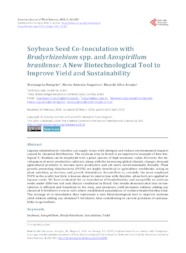Soybean seed co-inoculation with Bradyrhizobium spp. and Azospirillum brasilense: a new biotechnological tool to improve yield and sustainability.
Soybean seed co-inoculation with Bradyrhizobium spp. and Azospirillum brasilense: a new biotechnological tool to improve yield and sustainability.
Resumo: Legume nodulation by rhizobia can supply crops with nitrogen and reduce environmental impacts caused by chemical fertilization. The soybean crop in Brazil is an impressive example of how biological N2 fixation can be employed with a plant species of high economic value. However, the development of more productive cultivars, along with the increasing global climatic changes demand agricultural practices to become more productive and yet more environmentally friendly. Plant growth-promoting rhizobacteria (PGPR) are highly beneficial to agriculture worldwide, acting in plant nutrition, protection, and growth stimulation. Azospirillum is, certainly, the most employed PGPR in the world, but little is known about its interaction with rhizobia, when both are applied to legume seeds. We have evaluated the co-inoculation of bradyrhizobia and azospirilla on soybean seeds under different soil and climate conditions in Brazil. Our results demonstrated that co-inoculation is efficient and beneficial to the crop, and promotes yield increases without adding any chemical N fertilizers even in soils where established populations of soybean bradyrhizobia exist. The strategy of co-inoculation thus represents a new biotechnological tool to improve soybean yield without adding any chemical N fertilizers, thus contributing to current practices of sustainability in agriculture.
Ano de publicação: 2015
Tipo de publicação: Artigo de periódico
Unidade: Embrapa Soja
Observações
1 - Por padrão são exibidas publicações dos últimos 20 anos. Para encontrar publicações mais antigas, configure o filtro ano de publicação, colocando o ano a partir do qual você deseja encontrar publicações. O filtro está na coluna da esquerda na busca acima.
2 - Para ler algumas publicações da Embrapa (apenas as que estão em formato ePub), é necessário ter, no celular ou computador, um desses softwares gratuitos. Sistemas Android: Google Play Livros; IOS: iBooks; Windows e Linux: software Calibre.
Acesse outras publicações
Acesse a Base de Dados da Pesquisa Agropecuária (BDPA) para consultar o acervo completo das bibliotecas da Embrapa.

